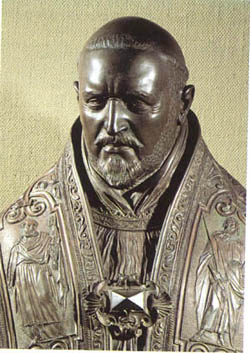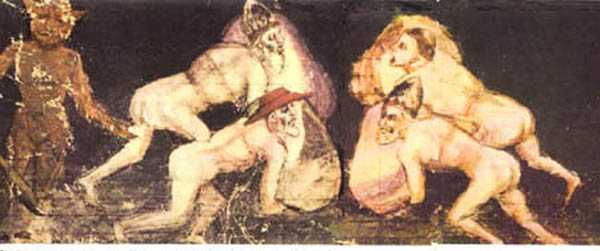 |
Traditionalist Issues
How a Catholic Should Act
in the Face of Bad Popes
Prof. Plinio Corrêa de Oliveira
I received this question: How should a person who seeks the truth act in a period when bad Popes are reigning, as, for example, during such a time in the Renaissance?
Infallibility in the extraordinary papal teaching
This question is not very difficult to answer in terms of Catholic doctrine. The source of truth is Revelation, that is Scriptures and Tradition. The Catholic Magisterium gives us the correct interpretation of Revelation. The Popes are infallible only when they teach a doctrine ex cathedra, when they officially invoke their prerogative of infallibility over that doctrine. In such a case, one cannot disagree with it.
The same happens with regard to Councils. Vatican II, for example, explicitly declared that it is not infallible. John XXIII also stated the same about this council. He specifically said that Vatican II would be a pastoral council, and not a doctrinal council. Therefore, it did not intend to teach any doctrine as infallible; its aim was only to give orientation.
There are Councils that taught dogmas, Vatican Council I, for instance, which promulgated the dogma of Papal Infallibility. In such case, we have the obligation to accept this truth without discussion because of the infallible power Jesus Christ gave to the Sovereign Pontiff to teach and guide the Church.
In the pontificate of Pope Pius IX, two dogmas were proclaimed in different ways. The first was the dogma of the Immaculate Conception that the Pope proclaimed ex authoritate propria – by his own authority – without the support of any council. The second was the dogma of the Papal Infallibility that he defined with the support of Vatican Council I in 1870. These solemn proclamations of dogmas are part of the extraordinary papal magisterium.
Infallibility in ordinary papal teaching
Another way to exert the privilege of infallibility is when many Popes teach the same doctrine in documents of their ordinary magisterium. Each document is not infallible per se, but when a long series of documents teach the same thing, that doctrine becomes infallible since it is not possible for Divine Providence to allow the Church to embrace an error for a long period of time. It would be absurd. Therefore, a long series of encyclicals teaching the same doctrine also are infallible. This is called the infallibility of the ordinary papal magisterium.
The faithful used to be quite secure about what doctrine to follow. Until Vatican II, the Popes consistently and continuously taught the same doctrine. Through the centuries many pontifical documents confirmed one another and repeated the same points of doctrine. For this reason, the faithful had a complete tranquility of mind about what is right and wrong and what should be accepted or rejected.
The Popes can make bad actions and should not be followed
Now, let us analyze the situation of a Catholic in the Renaissance. The Renaissance Catholic often saw bad Popes doing things that the doctrine of the Church censured. Not only in their private lives, but also when they were acting as Popes.

Pope Paul V lacked Catholic humility - by Bernini |
For instance, near the completion of the construction of St. Peter’s Basilica, Pope Paul V, who was from the Borghese family, ordered the architects to inscribe in gold letters on the dark blue mosaic strip over the facade’s columns these words: Paulus Quintus Borghesi fecit – Paul V of the Borghese family made this. That is, he lacked even the most elementary modesty. No one with a little sense of shame would place such words exalting himself and his family on the greatest church of Christendom: “It was I who did this.” None of you would build a house and then place a large sign over the door saying “John Smith made this.” It would give the unpleasant impression that you were a megalomaniac.
Also, on the beautiful bronze doors of St. Peter Basilica, along with other things, the legend of Leda and the swan was sculpted. This is a story that involves bestiality. So, the Pope permitted such a pagan legend on the portals of the Vatican Basilica. Who can defend such a display of paganism in the Basilica of St. Peter? No one. It was a bad thing to do.
What should be the attitude of the faithful with regard to that prideful act of Paul V? Since the Pope did such a thing, it would seem it could not be a sin Nonetheless, Catholic doctrine says it is. Someone might experience a problem of conscience in face of the contradiction.

Lucrezia Borgia in her apartment by Rossetti |
There is no reason for a problem of conscience. When a Pope sins, when he does something bad or wrong, his position as Pope does not change the nature of the action. It is bad. No papal infallibility is involved.
How can one know when something is wrong? He needs only to check with the prior teaching of the Church. If the constant teaching of the previous Popes, Moral treatises and sentire cum Ecclesia [thinking with the Church] taught differently, the new Pope acted against Catholic doctrine and did something bad. And the Catholic faithful in the times of the Renaissance had sufficient means to reject those bad actions of the Popes.
When I was at the Vatican, I visited the apartment of Lucrezia Borgia, the daughter of Pope Alexander VI. It was a scandalous thing, but she used to promote all kind of debauched behavior there. The walls have immoral pictures on them. Any tourist who wants to visit the apartment can see them, and her story is told by the Vatican guides.
What should a Renaissance Catholic do in face of such example? Should he think that he can also be immoral because the Pope had a daughter and permitted her to act in such a dissolute way? Should he think that Catholic Morals had changed? No. He simply should have the honesty to realize that the Pope sinned by doing what he did, and that his daughter sinned as well. A Catholic should not follow the bad habits of the Pope, but the dictates of Catholic Morals.
Popes can commit doctrinal errors
But what about doctrine? Can a Pope commit an error in doctrinal matters? Yes, he can. This in implicit in the very notion of infallibility. When Popes do not invoke the privilege of infallibility, they can err. Infallibility means the impossibility to fail, to err, to fall. If the Pope himself states that a document is not infallible, it is because it is fallible. So, he can commit errors.
How can the Catholic know when there is an error? He can refer to the previous magisterium and verify if there is a long succession of papal teachings affirming the same thing. If there is not, or there is some difference in teaching, the new teaching of that Pope is wrong. It is very simple. This is not to say that each Catholic should take it upon himself to judge the Pope. I am not encouraging that. What I am saying is that if there is a clear and continuous teaching of the previous Popes saying the opposite of the teaching of the new Pope, the latter ipso facto (automatically) has been judged by that previous teaching. The Catholic faithful is only acknowledging the error.
Someone could object: Why are the documents of the previous Popes more credible than the documents of the new Pope?
Because a long series of papal documents consistently teaching the same doctrine enjoys the privilege of infallibility of the ordinary papal magisterium. An isolated document of a new Pope who does not invoke infallibility regarding its doctrine can be fallible.
Someone could ask: How long can we have an erroneous teaching in the Church that opposes the correct one?
I don’t know the answer to that question. I think that this is something that future theologians will have to study.

A Pope, a Cardinal and a monk along with an Emperor being punished in Hell
Miniature from the 14th century - Biblioteca Vaticana
|

This lecture by Prof. Plinio Correa de Oliveira was translated
from the transcript of the tape by Atila S. Guimarães
Posted January 9, 2005

Related Topics of Interest
 St. Leo II Condemned Pope Honorius as a Heretic St. Leo II Condemned Pope Honorius as a Heretic
 Declaration of Resistance to the Vatican Ostpolitik Declaration of Resistance to the Vatican Ostpolitik
 Doubts about the Sanctity of John XXIII Doubts about the Sanctity of John XXIII
 The New Mass: A Flavor of Protestantism The New Mass: A Flavor of Protestantism
 The Kiss and the Blood The Kiss and the Blood

Related Works of Interest
|
|
Traditionalism | Hot Topics | Home | Books | CDs | Search | Contact Us | Donate

© 2002- Tradition in Action, Inc. All Rights
Reserved
|
 |
|